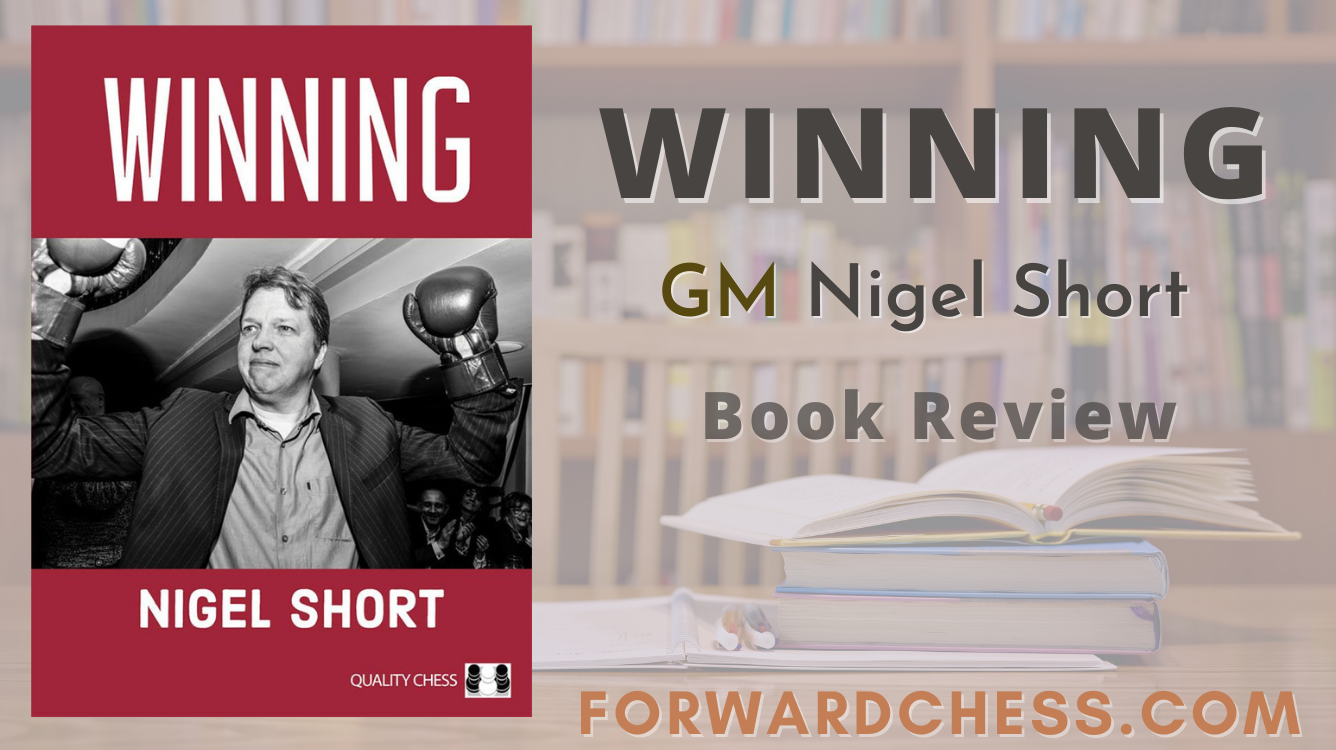Review: Winning
“You cannot be serious.” – John McEnroe, berating a tennis umpire.
Like John McEnroe in tennis, English GM Nigel Short has somewhat of a “bad boy” image in the chess world. Who can forget his stance with Kasparov to play their 1993 world championship outside the auspices of FIDE, a move that led to a split in the chess world for some years? Then, there was the “no handshake” incident with Ivan Cheparinov in 2008 (over one million views on YouTube!). More recently, his 2015 comments on the strength of female chess players again caused controversy.
Given all this, it’s perhaps easy to forget how strong a player he was in his prime, including beating Karpov in the 1992 Candidates semifinal to end the epic series of Kasparov-Karpov matches. These days, he is more involved in coaching, administration, and commentary, but he still finds time to play in tournaments, such as the recent 2022 Vergani Open.

Winning is not the typical “best games” collection that we have come to expect from top players. Rather, it’s a record of eight tournaments that Short has won over a thirty-year span from 1987 to 2016. In itself, this achievement is testament to his strength and longevity. Since all the games from each tournament are included, we get a complete picture of his play, including losses and draws. Some of the draws are colourless, but Short doesn’t try to hide these. He writes:
“Winning contains a handful of short draws. It is not something I am greatly proud of, but they are a part of the narrative. If you want, just skip them completely: you will not suffer great loss, as you will still have more material than in Bobby Fischer’s My 60 Memorable Games.”
This quote is a good example of Short’s witty writing style throughout the book. He can be very forthright in his views. Here are some examples:
- When you are winning, Wijk aan Zee seems the most delightful, charming traditional tournament with friendly organisers set in a cosy, seaside village. But when you are playing badly, bored of pea soup, and walking alone at night on the windswept dunes, lashed by rain and chilled to the bone, the distant fiery furnaces of the steel mill that lights the horizon seem like a vision of eternal damnation to come.
- When you hear “experts” saying that active defence is always preferable, just remember that these people don’t what they are talking about.
- Overprotecting e4. An absurd principle, which I acquired from reading that self-promoting charlatan, Aron Nimzowitsch.
- Any 2500 Elo-rated player (if not my grandmother) could have displayed more strategic understanding than the Latvian/Danish grandmaster did in that game. [Again, aimed at Nimzowitsch over his famous loss to Capablanca in New York, 1927, while Short was commenting on his own system against the Caro-Kann.]
- It is quite fitting that Nemesis is a female deity, as Judit [Polgar] has caused my downfall many times over the years.
However, he saves the harshest criticism for himself:
- Black’s [Short’s] opening preparation for this game was wishy-washy and inadequate. How so, from a supposedly serious player? Laziness and incompetence are possible answers, although I worked for a couple of hours before play commenced.
- Demonstrating that I don’t have a clue what I am doing. This can happen when you enter unfamiliar positions without preparation.
- In 2003, I did not have the benefit of an iPhone strapped to my leg, or an ear-piece, but could see for myself that I had botched the position.
The game analysis avoids lengthy computer-generated lines for the most part and concentrates on explaining the key issues in the games. Short writes about a variation in the game against Polgar:
“The following is complicated and takes hours to understand. These are not exhaustive analysis. Not only because I am pathologically indolent, but because no one reads long variations in chess books.”
Two examples from the book are given below, with annotations from the book.
In summary, this is an excellent and unique book. Short has given an honest account of some of the highlights of his career. He doesn’t mince words when it comes to his own play and that of his opponents, and he also gives some very colorful commentary on some of the top players and tournaments. In addition, the analysis is very clear and instructive. Hence, this is a book that can be recommended to players of all levels.

- 1000 Published books on Forward Chess - November 15, 2024
- Book Review: A Guide To Chess Improvement - September 9, 2024
- Review: Chess Coach by Vladimir Barsky - August 26, 2024
